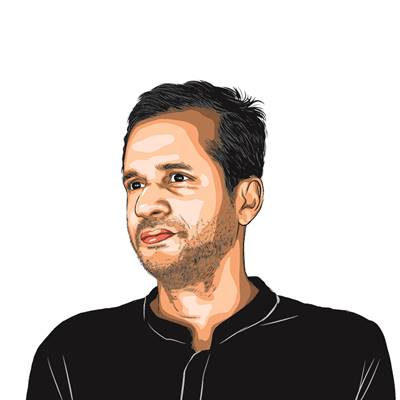Opinion In India, the idea of democracy differs from its practice
Our politics increasingly seems unmoored from certain human values considered essential for democracy. Thus, another way of imagining a democracy that is engaged with the human being is challenging.
 Gandhi did not favour the constitutionalisation of democracy which, according to him, has to be preserved in society as an essential value.
Gandhi did not favour the constitutionalisation of democracy which, according to him, has to be preserved in society as an essential value. According to Italian political philosopher Giorgio Agamben, democracy is both a means of constituting the body politic and a technique of governing. As a technique of governance, democracy has been a source of legitimacy for governments to exercise power and control or govern the “population” since the French Revolution. In societies, on the other hand, it is a natural sentiment, an essential value. Freedom to dissent, demand justice, recognise differences and respect the rights of others are driving forces of democracy in the first sense. The “majoritarian consensus” determines the character and content of democracy in the second sense.
In practice, democracy as a principle seldom overpowers the notion of democracy as an administrative practice. It is no different in India. Questions about the state of democracy come up only around crises of procedures like those related to elections or institutions like Parliament. Few seriously examine what values should mark democracy in a country like India where pluralism, diversity and tolerance are necessary for society to survive.
The idea of democracy was introduced and nurtured during the national movement. Despite its upper-caste and middle-class content, the values and principles of democracy became entrenched in politics and thereby in the political imagination of the people in subtle ways. Even those opposed to Gandhi, Ambedkar and socialists converged on the notion and importance of tolerance and dissent.
Due to the structural inequalities of Indian society, B R Ambedkar considered democracy a value that the Constitution must protect and guarantee. Gandhi did not favour the constitutionalisation of democracy which, according to him, has to be preserved in society as an essential value. He did not want to privilege and legalise democracy as a part of constitutional morality over a traditional, social morality. In his view, it was not a part of our natural sentiment. Rather, it was artificially cultivated or externally imposed — which is in contrast to the “real” democratic tradition in India that flourished through religious co-existence.
In the early years after Independence, the Indian state maintained some commitment to justice and fundamental rights but tolerance of dissent remained an incomplete project. The state’s position as “guardian of democracy” resulted in many unpleasant episodes, including the proclamation of Emergency by Indira Gandhi in 1975. What makes the present situation different from previous experiences is that the clout of certain kinds of organisations is no longer seen as abnormal. This happened during the Emergency as well – Sanjay Gandhi’s hold on the government is well-known. But the current regime has legitimised the sway of organisations like the RSS through popular means. The conditions of a working democracy may be the same for seven decades, but the principles and values have the potential to be altered.
Our politics increasingly seems unmoored from certain human values that are often considered essential for democracy. Thus, another way of imagining a democracy that is engaged with the human being and a concern for everyday life is challenging in our situation.
Alain Badiou describes democracy as the dominant “emblem” in a political society. One can express displeasure over the functioning of political society, denounce the structure or any aspects of it, or criticise political parties that are a part of it. You will always be pardoned as long as you do it in the name of democracy. This observation becomes more pertinent in the Indian context, especially when everyone, including those who are against democracy, engages in discussions on forms of democracy, when concern over the very content and values of democracy struggle to capture popular imagination.
The writer is professor, School of Gandhian Thought and Development Studies, Mahatma Gandhi University, Kerala






